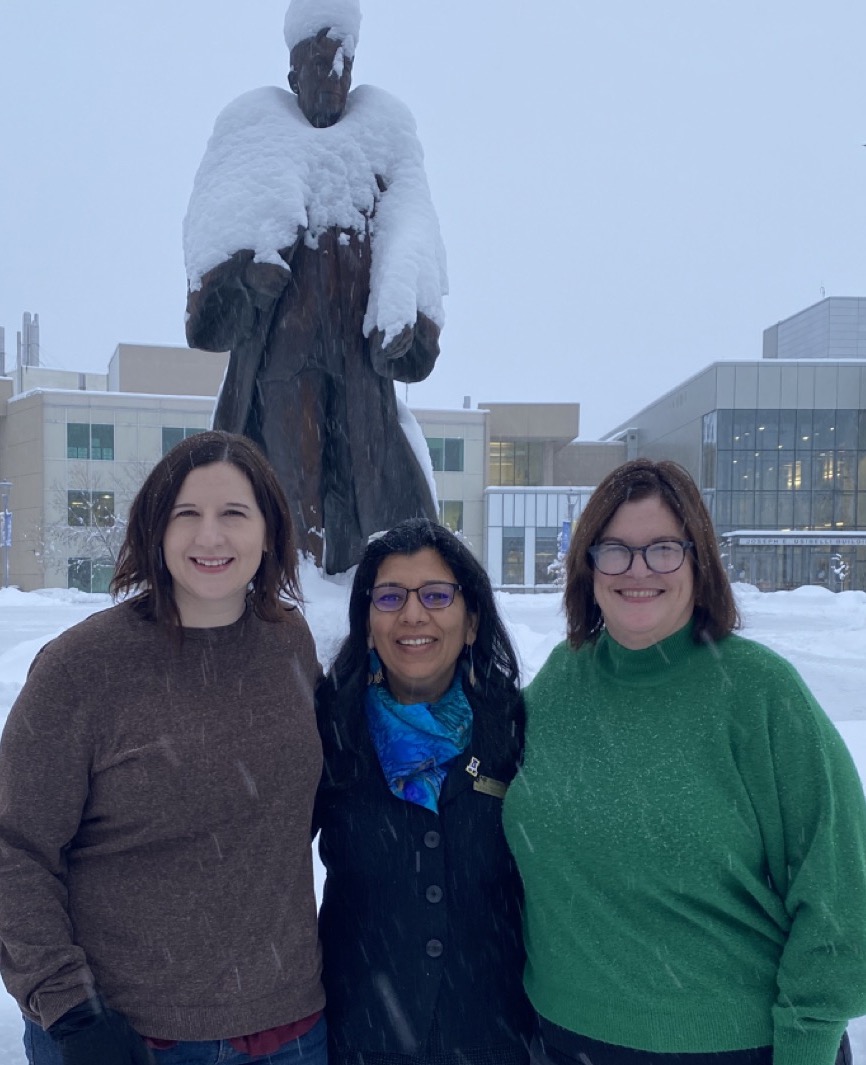Friday Focus: Let’s talk about accreditation

Michelle Strickland, former accreditation coordinator; Anupma Prakash, provost and executive vice chancellor; and Alex Fitts, vice provost and accreditation liaison officer pose in front of the snow covered statue of Charles Bunnell.
Dec. 9, 2022
— by Anupma Prakash, provost and executive vice chancellor
Did you know that the University of Alaska Fairbanks has been accredited by the Northwest Commission on Colleges and Universities (NWCCU) since 1934? But what does this mean?
What is accreditation and why is it so important? Simply put, accreditation is a quality stamp – a stamp of assurance. For students, the stamp means they can trust UAF to provide a high standard of education imparted by qualified faculty. Students can also be assured of many opportunities and support services that are geared to set them up for overall success. For external employers, it means they do not have to second guess the quality of learning and preparation that comes with the academic degree from UAF. For faculty and staff, it means they are a part of an institution that is resourced to meet the standards necessary to receive accreditation. Accreditation also makes UAF eligible to receive federal financial aid as well as additional grant-funding.
Accreditation is a voluntary process of self-regulation, continuous improvement, and peer review. It is a rigorous process that is adopted by colleges and universities across the nation and that the educational community distinctly recognizes (more information here). Because of the rigor of the process and the common acceptance of standards, accreditation makes it easier to transfer credits between UAF and other institutions.
Misunderstanding about accreditation: There is a lot of misunderstanding about accreditation that stems from a lack of clarity about the distinction between “Institutional accreditation” and “Specialized or Programmatic accreditation”.
Institutional accreditation applies to the entire institution, indicating that each of an institution's parts is contributing to meeting the institution's overall mission, vision, goals, and accreditation standards. The importance of Institutional accreditation cannot be overstated. UAF’s Institutional accreditation comes from NWCCU, an independent, non-profit accrediting agency recognized by the United States Department of Education and the Council on Higher Education Accreditation. NWCCU’s role is to develop evaluation criteria and conduct peer evaluations to assess whether its member institutions meet those criteria.
Specialized or programmatic accreditation typically applies to specific units or academic programs within schools and colleges that are a part of the university. UAF holds several specialized accreditations, certifications and standards. In some academic disciplines specialized accreditation or certifications are required or are a major asset for employment. In other academic disciplines it is simply a voluntary choice to go through additional peer-review for a continuous self-improvement process and to potentially attract more students and faculty. Programs may elect to go for specialized accreditation or may choose to forego being a part of the process. A discontinuation of a programmatic or specialized accreditation does not change the Institutional accreditation of the university!
UAFs accreditation cycle and accreditation indicators: The accreditation process has a seven-year cycle. This means that once a university has received accreditation, the accreditation must be reaffirmed every seven-years. UAF began a new seven year cycle following our reaffirmation of accreditation in spring 2021. UAF is now scheduled for a third-year mid-cycle site visit on Oct. 2-3, 2023; a review of policies, regulations and finances in fall 2026; and a comprehensive 7-year review in fall 2027.
UAF has identified 14 indicators of mission fulfillment for our new seven-year accreditation cycle that fall under Student Success and Degree Attainment, Research, Skilled Workforce, and Equity, Diversity and Inclusion. These indicators are evaluated annually to assess where UAF is meeting its mission-driven goals, and where there is room for improvement.
Your role in Institutional accreditation: If you are a student, staff, faculty, administrator, alumni, volunteer, supporter, or have any association with UAF, you have a definite role in UAF’s Institutional accreditation. It may sometimes be hard to recognize this connection. Student testimonies on how their success was tied to the support from a caring academic advisor, a trusting colleague, a faculty who believed in them, or a catering staff who paid for their meal one day are far too common. Each of you play a role individually and collectively in building an environment and culture that keeps students at the center of what we do and contributes to student success with an equity lens – a key accreditation standard.
Accreditation team and resources:
UAFs accreditation liaison officer (ALO) is our Vice Provost, Dr. Alex Fitts, who has served as our ALO for nine years. She works closely with NWCCU Senior Vice President, Dr. Ed Harri, who is the primary NWCCU staff contact for UAF. Dr. Fitts compiled our 2020 self-study report with input from a large team and led the efforts that resulted in the reaffirmation of our institutional accreditation. A big shout out also goes to Michelle Strickland, who served as our accreditation coordinator supporting the work of Dr. Fitts for eight years. Michelle’s institutional knowledge and attention to detail kept the important accreditation efforts on track. Going forward, we have four faculty fellows: Dr. Retchenda George Bettisworth, Dr. KyungSook Lee, Dr. Veronica Plumb and Dr. Sabine Siekmann, who have stepped up to work with Dr. Fitts in our accreditation and assessment efforts. More updates on these efforts will be posted on UAFs accreditation site.
Accreditation takes a lot of work to attain as well as to maintain. The accreditation team may help to analyze the data and compile the report, but the work behind meeting the accreditation standards is everyone’s responsibility. Accreditation is everyone’s business. When the evaluation team arrives at UAF this fall for a site visit, we will all play a significant role in welcoming them to our community.


